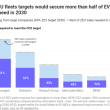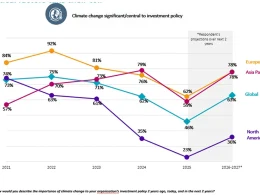US sustainable funds faced record outflows of nearly $20 billion in 2024, according to Morningstar, a sharp increase from the $13 billion in withdrawals recorded in 2023. This downturn in ESG investing follows years of inflows and reflects mounting political and economic challenges in the world’s largest economy.
The Morningstar report highlighted that 2024 was a “turbulent” year for ESG investments. Hortense Bioy, head of sustainable investing research at Morningstar Sustainalytics, attributed the decline to the politicisation of ESG issues, persistent high interest rates, greenwashing concerns, and investor preference for conventional strategies during a bull market.
Conventional funds, by contrast, attracted $740 billion in net inflows over the same period. ESG funds underperformed in part due to their exposure to renewable energy stocks, such as wind and solar, which were hit hard by rising costs and policy uncertainty.
The return of Donald Trump to the White House on 20 January 2025 has added to the uncertainty surrounding ESG investing. Trump’s pro-oil and anti-wind energy stance has raised concerns about the future of climate finance under his administration. Following Trump’s election victory, renewable energy stocks experienced a sharp sell-off, reflecting investor scepticism about the sector’s growth prospects.
Bioy warned that ESG investing now faces a “very uncertain” future under the new administration. The Republican Party has made ESG a political target, branding it as a “woke” distortion of profit-driven capitalism.
Morningstar data also revealed a significant slowdown in ESG product development, with just 10 new sustainable funds launched in 2024 – the lowest figure in a decade.
Parnassus Investments, the largest US sustainable investor, experienced the worst redemptions, with $7.3 billion in withdrawals last year. Meanwhile, Vanguard Group, which withdrew from the Net Zero Asset Managers initiative in 2022, emerged as the leading seller of sustainable funds in 2024.
Bioy noted the rise of “greenhushing,” where companies underplay their sustainability efforts to avoid political and legal backlash. “Under the new Trump administration, we may see litigation pressures exacerbate ‘greenhushing’,” she said, highlighting the growing challenges for sustainability-focused investors.
















